Overall Health
Pointy canine teeth may be a good look for a vampire. But if you’re one of the many people whose canines are pointier than you’d like, we want you to know that there are various ways that your dentist in Sparks can use cosmetic dentistry techniques to reshape your teeth and revitalize your smile.
All About Canine Teeth
Canine teeth are those four teeth in the top and bottom of our mouths that are naturally pointy in shape. Some people refer to them as vampire’s teeth, and they can somewhat look like dogs’ teeth, hence the name canine. The unique shape of the canine teeth helps us eat by allowing us to tear, hold, and chew food. But if you think your canines are too long or too pointy, let’s check out a few ways your dentist in Sparks can help.
3 Ways to Change The Shape of Teeth
Cosmetic dentistry isn’t only meant for people who want to get a brilliantly white smile. In fact, it can fix a whole bunch of aesthetic concerns. Three of the best ways to fix pointy teeth through cosmetic dentistry are:
- Bonding
- Veneers
- Recontouring
Bonding
Dental bonding is the most conservative way a dentist can change a tooth’s appearance. The treatment involves applying a tooth-colored material to a tooth and sculpting it into an ideal size and shape. Bonding can also fix chipped teeth, slightly overlapped teeth, and even crooked teeth.
Veneers
Dental veneers are thin pieces of porcelain that are attached to the front surface of teeth. They can cover up discoloration, fill in gaps, and change the size or shape of teeth. The procedure requires your dentist to remove a small portion of enamel for the veneer to fit. But after that, you’re left with a new, natural look.
Recontouring
Another way your dentist in Sparks can change the shape of your teeth is through tooth recontouring. This quick and easy treatment allows your dentist to use an artistic eye to gently remove tooth enamel to alter the size or shape of a tooth. Only a few millimeters of enamel are removed so it’s a painless procedure.
Changing the look of your smile doesn’t need to be complicated or expensive. Start your smile makeover journey by talking with a dentist about your options.

Prior Dental Experiences
A study published in the National Library of Medicine found that many people who are scared of the dentist can trace their fear back to a negative experience, usually one that occurred during childhood. Now, this doesn’t necessarily mean that the dentist was bad. In fact, more research suggests that there is a correlation between the type and amount of dental treatment a child has had and the severity of their dental anxiety. For example, a child that had multiple serious treatments such as extractions is more likely to have dental fear later in life than kids who visit the dentist regularly and experience ongoing preventive care.
Learned Behavior
Even if someone personally didn’t have a negative experience in the dental chair growing up, they may still have a fear of seeing their dentist in Sparks due to learned behavior or mindset from a parent, sibling, or another close acquaintance. This is one reason why it’s so important to speak positively about seeing a dentist (or any doctor for that matter) around kids and others.
White Coat Syndrome
Occasionally, some people have a negative body reaction whenever they visit a dentist or medical doctor. This can be known as white coat syndrome. White coat syndrome can cause a spike in blood pressure whenever in a doctor’s office. An increase in blood pressure can cause someone to feel uneasy, hence the feeling of being scared of the dentist.
Personality Traits
The same National Library of Medicine study from above also examined two types of personality traits and how they may relate to dental fear. The two traits were:
- Extraversion – warm, excitement-seeking, assertive
- Neuroticism – anxious, self-conscious, showing depressive symptoms
The scientists found that those two traits may have a correlation to dental anxiety with neuroticism being more likely to experience dental fear.
Overcoming Dental Fear
We understand that fear is a very real feeling for many people. But there are some tricks you can try to help overcome dental fear such as:
- Using relaxation techniques
- Asking about the use of sedation dentistry
- Finding the right dentist that makes you feel comfortable
- Listening to music
- Talking with your dental team about your fears and communicating often
Being relaxed and comfortable when you visit your dentist in Sparks is important for many reasons. One of those reasons is that you will be more likely to keep up with appointments every six months, which can go a long way in keeping your teeth healthy and reducing the need for complex treatment.
If you’re overdue for a dental appointment, talk with us. We’re here to help you keep you relaxed and at ease, and the more we know about your fear the better we can assist you.
What we eat and drink can certainly affect our overall health. But did you know they can also affect dental health? Some beverages are beneficial for teeth while others can wreak havoc in your mouth. Tune in as your dentist in Sparks talks about which drinks you should enjoy regularly and which you should avoid or drink in moderation to protect your teeth.
Soda
This shouldn’t come as a surprise, but soda of any kind is bad for your teeth. This also includes sugar-free options. Soda is typically loaded with sugar, but that’s not the only problem. It’s also acidic and can weaken tooth enamel, making it easier for bacteria to attack teeth and create cavities. In fact, studies show that even diet soda or sugar-free options can still break down enamel thanks to the acid.
Fruit Juice & Fruit Punch
Drinking something with fruit right in the name may seem like a healthy option, but this can be deceiving. Most commercial fruit juices contain added sugars and are made from concentrate, not actual fruit juice. If you can find an option that is 100% fruit juice and doesn’t have added sugars, it’s an ok option. Fruit punch on the other hand isn’t actually juice or fruit at all. They’re mostly sugar and acidic.
Alcohol
Not all alcohol is necessarily bad for teeth if enjoyed in moderation. Early studies on beer, for example, may show a beneficial effect on teeth because of the hops. More research is needed to be sure. But other alcoholic drinks like wine are often acidic and can weaken enamel. Alcohol is also naturally drying, so it can easily dry out the mouth. A dry mouth is a haven for bacteria to thrive.
Sports Drinks
Often marketed as a great option for active people, sports drinks are high in sugar and are also acidic. As we’ve mentioned, this duo can be dangerous to teeth and increase the risk of dental problems.
What To Choose Instead
When it comes to choosing the best beverages for your family, there are some great options available that can quench your thirst and benefit your oral health.
Water
Your dentist in Sparks can’t stress the importance of drinking enough water every day. This not only helps keep your body hydrated, but it also helps wash away bacteria, neutralize acid, and promotes saliva production.
Milk
We all know that milk helps build strong bones, but it can also help build strong teeth and keep them strong. Milk contains calcium, phosphorus, and vitamin D, all of which are beneficial for teeth. Milk also contains caseins, a protein that forms a protective barrier on teeth to keep bacteria and acids away. However, because milk also contains sugar, your dentist in Sparks recommends drinking milk in one sitting and not over a period of time.
Tea
Even though drinking too much tea can stain your teeth and make you explore teeth whitening options, it does have some health benefits. Black and green tea in particular may inhibit the growth of bacteria and help keep decay away. Tea can also decrease acid production which can protect teeth even more. However, keep in mind that these studies were for unsweetened tea. Any sweetener from sugar to natural honey can encourage decay.
To help protect your teeth against decay, choose what you drink wisely. If you do indulge in beverages that aren’t so great for your smile, especially acidic ones, try to use a straw and wait at least 20 minutes after drinking to brush your teeth.

What is Sleep Apnea?
Sleep apnea is a condition that occurs when a person stops breathing while sleeping. This can happen for a few seconds or longer, and you may not even know it’s happening. Interruptions in breathing during sleep can cause oxygen levels to drop and carbon dioxide levels to rise, making sleep and rest difficult to achieve.
Know The Signs
Signs and symptoms of sleep apnea may appear during sleep as well as when you are awake. Pay attention to your sleep habits and how you feel while awake, and keep an eye out for:
During Sleep
- Snoring
- Mouth breathing
- Difficulty staying asleep
- Pauses in breathing or gasping for breath
While Awake
- Irritability
- Sleepiness
- Morning headaches
- Waking up with a dry mouth
If you notice any of the signs of sleep apnea, schedule an appointment with your dentist in Sparks.
Causes
Sleep apnea occurs when the throat muscles relax so much during sleep that they block the airway, making breathing difficult. This can happen for a number of reasons:
- Obesity
- Family history
- Nasal congestion
- Large tonsils or adenoids
Other risk factors that can make someone more prone to developing sleep apnea include high blood pressure, type 2 diabetes, Parkinson’s disease, and smoking.
How is Sleep Apnea Diagnosed?
The first step in getting a proper diagnosis is to see your dentist in Sparks for an evaluation. The next step can vary depending on your symptoms and exam. The following step may include tests such as a sleep study, measurement of oxygen levels overnight, or an electrocardiogram. Your dentist may also examine the size of the tonsils.
Treating Sleep Apnea
Treatment varies from patient to patient and can range from:
- Medications such as nasal spray or allergy medicine
- Tonsil or adenoid removal
- CPAP machine
- Oral appliance
Sleep apnea can be scary, but treatment is available. If you’re experiencing symptoms of sleep apnea or you share a bedroom with someone who has symptoms, consider talking with your dentist. Come prepared with symptoms and a log of when you notice them as well as any family history of sleep apnea.
Each and every February, loved ones throughout the United States go above and beyond preparing for Valentine’s Day. Whether you choose to show your love with chocolates or flowers, one thing remains constant — bright red hearts are everywhere we look. But there’s another reason (besides Valentine’s Day) that we should pay attention to these hearts. February is American Heart Health Month and focuses on raising awareness of how daily choices affect our risk of heart disease. In fact, this holiday has a special place in your Sparks dentist’s heart because there is a strong connection between oral health and heart health.
What is Gum Disease?
Gum disease is an infection in the gum tissues usually caused by a buildup of bacteria and plaque. When someone doesn’t brush their teeth often enough or well enough, plaque is left behind and can easily work its way up under the gum, settle in, and cause trouble.
There are four stages of gum disease including:
- Gingivitis
- Slight Periodontal Disease
- Moderate Periodontal Disease
- Advanced Periodontal Disease
Gum disease can be treated if caught in the gingivitis stage, so make sure you visit your dentist in Sparks every six months for dental cleanings, x-rays, and thorough exams so we can identify any problems early.
What Does This Have to Do With Your Heart?
If gingivitis isn’t diagnosed and treated quickly it will progress into slight, moderate, or advanced periodontal disease, all of which are irreversible. When gum disease progresses into these advanced stages, the infection can enter the bloodstream and travel throughout the body. This can affect areas outside of the mouth, including the heart.
Heart Disease
Bacteria from gum disease in the bloodstream causes the body to produce too much C-reactive protein (CRP). Higher than normal levels of CRP can lead to serious conditions such as:
- Inflamed arteries
- Blood clots
- Heart attacks
- Strokes
Knowing that your oral health can have such an impact on your overall wellness makes it so incredibly important that you practice good oral hygiene habits at home, including brushing twice a day for two minutes and flossing every day.
Signs of Gum Disease
Since early diagnosis is so crucial to treating gum disease before it has the chance to affect the rest of your body, you need to know the signs of gum disease. Keep an eye out for:
- Bleeding when brushing or flossing
- Puffy, tender gums
- Bad breath
- Loose teeth
If you notice any of the signs of gum disease, call your dentist in Sparks to schedule an appointment. This American Heart Health Month, commit to reducing your chances of heart disease by brushing and flossing every day, seeing your dentist in Sparks twice a year, exercise, and eat a healthy diet. For more ideas on how to live a heart-healthy life, visit the National Heart, Lung, and Blood Institute.
Re-posted with the permission of Perio Protect.
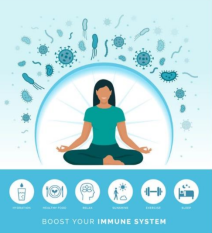 One of the strongest defenses we have against virus’, such as COVD-19, is a robust immune system so we can fight infection – that’s why we’re doing our best to help our patients boost their immunity.
One of the strongest defenses we have against virus’, such as COVD-19, is a robust immune system so we can fight infection – that’s why we’re doing our best to help our patients boost their immunity.
There are a number of scientifically-based recommendations to help boost your immune system such as eating nutritious foods and balancing our diet, making sure to get adequate sleep and physical activity, getting outdoors for some sunshine, and managing stress.
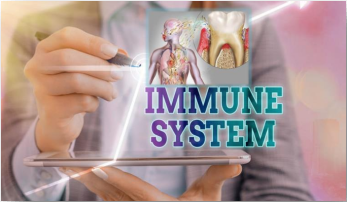
But also, research suggests that treating chronic infections, including in the mouth, may help improve immunity.

Poor oral health influences immunity and if periodontal disease (gum disease) is left untreated, it may negatively impact your overall immunity.
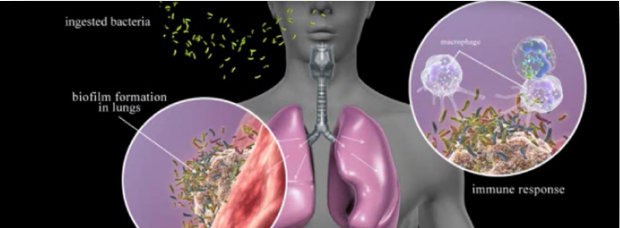
For many years we’ve known that bacteria from gum disease can be aspirated into the lungs. When this happens, the lung’s ability to fight infection is disrupted, which may increase the risk for co-infections, such as virus’, like COVID-19.

That’s why, more than ever before, we’re being especially diligent in examining patients for gum disease or any signs of oral inflammation. And, for those who have gum disease, it’s important to get treated as soon as possible.
Thorough oral hygiene will reduce the bad bacteria in your mouth. That’s a good thing! This includes brushing your teeth twice a day with an anti-microbial toothpaste, and cleaning in between your teeth with floss or pics. A water irrigation device and antimicrobial mouthwashes are other tools for keeping your mouth clean. The goal is to decrease the bacterial burden in your mouth.
© 2020 Casey Hein BSDH, RDH, MBA. All Rights Reserved
Re-posted with the permission of Perio Protect.
With the outbreak of the coronavirus, treatment for inflammation and prevention of infection and disease is more important than ever. The human body can only handle so much inflammation, and the healthier a person is – the less chronic inflammation taxing the body – the easier it is to fight off other infections, including viral. This is why we take any infectious oral conditions, even asymptomatic gum disease, so seriously. Brushing, flossing and homecare may seem mundane, but so is washing your hands. These “mundane” acts can help keep you healthy.
Our office prescribes Perio Protect, a homecare system to prevent and treat gum disease. Special prescription trays, called Perio Trays®, are made just for your mouth to deliver medication deep below the gums to fight infections causing disease. The primary medication applied with the trays, Perio Gel® with 1.7% hydrogen peroxide, is highly effective at killing infectious bacteria and reducing inflammation.
Peroxide also kills the coronavirus. Using peroxide in these special prescription trays will not prevent you from contracting the virus, but the peroxide therapy, rinsing with peroxide or brushing with the peroxide gel may help reduce the viral load in saliva and the risk of oral transmission. For this reason, dentists may ask you to pretreat with a peroxide product before coming to the dental office.
Maintain A Healthy Smile and a Healthier Immune System
It has never been more important to keep your gums healthy. Gum health is key to keeping your teeth for a lifetime and important for a healthy immune system. The chronic inflammation from infected gums is also associated with arterial inflammation, heart disease, stroke, dementia and uncontrolled diabetes. For patients with these illnesses, it is especially important to see our dental team.
If you have been told that you have gum disease or if you are concerned about bleeding gums or chronic bad breath, both symptoms of infected gums, be sure to schedule an appointment. We believe that informed patients will make informed decisions. Be sure to contact us to discuss your concerns.
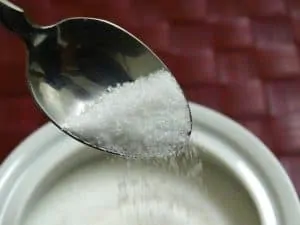
Xylitol: 101
While xylitol is yet another sugar substitute, it’s actually quite different from many others available at your local grocery store. First of all, xylitol is natural — it’s found in fruits, veggies, and even in our bodies during digestion. Second, xylitol tastes like sugar but doesn’t act like sugar once it’s in our bodies. This means you can still have a sweet treat without all of the negative side effects of actual sugar. You see, sugar is pretty harmful to our overall health. It can spike blood glucose levels and, over time, cause difficulties with your metabolism. This may result in weight gain or make it difficult to lose weight. Xylitol, on the other hand, is low in calories (it has 40% fewer calories than sugar!) and has a low glycemic index. As a result, blood glucose levels are nearly unaffected by xylitol, and bodies are protected. But that’s not all. As your dentist in Sparks knows, xylitol may protect oral health, too.
The Protective Power of Xylitol
We already know that xylitol is a healthier alternative to sugar and can protect our bodies. But the oral benefits of xylitol are also plentiful. Chewing gum that contains xylitol may:
- Prevent tooth decay
- Starve bacteria
- Prevent oral inflammation
- Reduce your risk of gum disease
- Remineralize teeth
- Increase saliva production
- Reduce the acidity of your saliva
- Help with calcium absorption
How does xylitol do all of that? We’re glad you asked.
Essentially, xylitol starves a dangerous bacteria commonly found in our mouths called Streptococcus mutans. These bacteria love to feed on sugar as it gives them fuel and allows them to multiply, which is a big problem. Streptococcus mutans is the main cause of plaque buildup, and when there are too many Streptococcus mutans, there’s probably also too much plaque. The result? An increased likelihood of developing cavities. But when we replace sugar with xylitol, we see a much different result. Streptococcus mutans bacteria will still feed on the xylitol, but instead of fueling the bacteria, xylitol actually starves them and they start to die. This means fewer bacteria and a lower risk of decay.
Even though chewing xylitol gum can go a long way in protecting teeth, it is not a replacement for good old-fashioned oral hygiene. Yes, gum can freshen breath, and yes, xylitol can help prevent decay, but if you don’t brush and you don’t floss, and if you don’t see your dentist in Sparks regularly, chances are xylitol won’t be enough to protect your teeth.
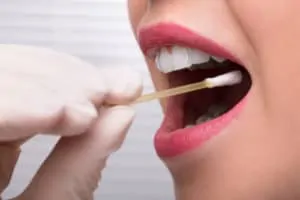
25,000 Quarts of What?
In your lifetime, you’ll produce an average of 25,000 quarts of spit. That’s enough saliva to fill a standard size swimming pool. But why do we need so much spit? We’re glad you asked.
Spit is an extremely important part of a healthy mouth as it helps remove food particles that may linger around after a meal. This is key to protecting teeth against dangerous bacteria that just love to feed on leftovers. The more spit we produce, the more food is rinsed away, and the better protected your teeth are. Spit’s superpowers don’t end there. Saliva can also help neutralize plaque acid, which can protect your pearly whites from decay.
Not Enough
There are times when you may not be producing enough spit. If this is the case, you probably feel as if your mouth is always dry, no matter what you do. Don’t ignore this symptom – call your Sparks dentist as soon as you can. A dry mouth is a serious problem that can increase the risk of decay since there’s not enough saliva to wash away food and bacteria and neutralize acids. Talk with your dentist to find out what may be causing your dry mouth and work together to find the best solution.
Spit and Overall Health
Spit’s benefits reach beyond oral health alone. Spit can help find bone marrow donor matches to help those with blood cancers. Unfortunately, the prevalence of blood cancers is extremely high, and every three minutes someone in the U.S. is diagnosed with blood cancer. This makes bone marrow really important. But patients can’t use just any bone marrow. There has to be a match. BeTheMatch.org is an organization that encourages people to join the bone marrow registry by simply swabbing the inside of the cheek and submitting it to their library where they’ll scan the registry to help find matches for patients. Who knew something so simple could help save a life?
Even though your dentist in Sparks may be more used to spit than you are, and while it may be a little gross, try to remember just how important it is for oral health and how it can help someone battling a very serious and very scary disease.
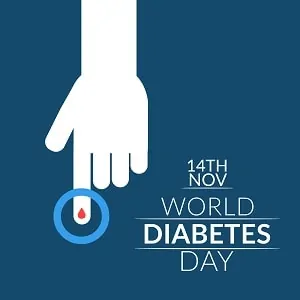
Oral Health & Diabetes
Diabetics and their caregivers are well aware of just how much the disease can affect the body, but an often overlooked side effect of diabetes is directly related or oral health. The truth is, diabetes can increase the risk for gum disease, oral infections, poor healing after dental treatment, and dry mouth. If you’re diabetic or have a loved one with diabetes, try these tips to keep oral health in tip-top shape.
Tip #1 – Regular Dental Care is Key
Practicing good dental habits at home is a great way to reduce the risk of diabetic complications related to oral health. Make sure to brush your teeth twice a day, every day, for two minutes. Use a soft-bristled toothbrush and scrub gently to avoid damaging your teeth or gums. Also, brushing your tongue and flossing every day can take your at-home oral hygiene routine one step further and remove even more plaque and bacteria. At our dental office in Sparks, we also recommend maintaining regular visits with our team so we can keep a close eye on oral health. This is especially important if you’re diabetic.
Tip #2 – Eat Smart
Those with diabetes know the importance of eating healthy to control their blood sugar levels, and we can’t stress enough how important a well-balanced diet is for your oral health, too. Minimize your sugar intake to avoid blood sugar spikes and to protect your teeth from its damaging effects. Choose fresh veggies, fruits, and whole grains for a complete diet that’s not only good for your body but also good for your smile. If you’re unsure which foods are best and worst for diabetic patients, talk with your doctor about creating a meal plan.
Tip # 3 – Level Out
Diabetics are accustomed to checking and maintaining their blood glucose levels, and for good reason. Spikes in blood glucose levels can damage essential organs such as the heart and kidneys. But increased blood glucose can also cause problems with your mouth. High blood glucose in diabetics also means a higher chance of loose teeth or even losing teeth altogether. Another oral health concern related to diabetes is gum disease. Gum disease is a serious condition for anyone, but diabetics may have more problems fighting the infection and, in turn, keeping their diabetes under control.
Join our dental office in Sparks in celebrating World Diabetes Day by wearing blue, scheduling a check-up with your doctor if you suspect you may have diabetes, and of course, always brush and floss.


